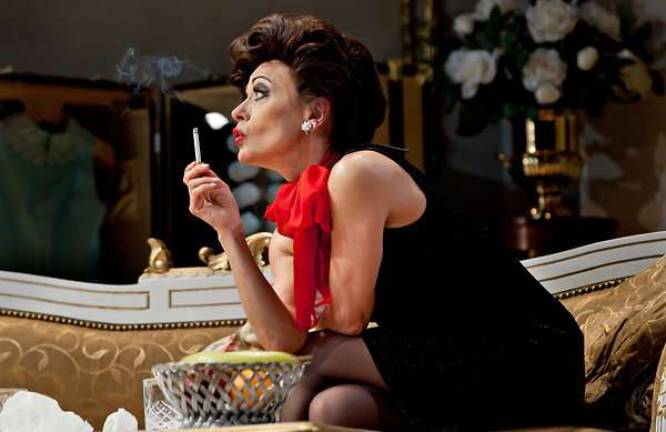Judging Judy

Tracie Bennett soars over the rainbow as Judy Garland By Doug Strassler Judy Garland is more than an icon. As one of the original movie stars of the Hollywood studio system, the triple threat bounced between family musicals and adult dramas with a precision and a talent that remains largely unmatched. Like Charlie Chaplin and Lucille Ball, she created a template that the powers that be have forever been trying, with varied levels of success, to replicate. She also created one of the most storied cautionary tales in the industry, thanks to her the many excesses and insecurities that led to her early death by overdose. End of the Rainbow, Peter Quilter's new bio play just opening at Broadway's Belasco Theatre, is far from the first work to take advantage of Garland's topsy-turvy life. And why wouldn't people mine the woman's story for narrative gold? She sang! She danced! She drank! She drugged! She was promiscuous! Oh, the music! Oh, the drama! Quilter's window into Garland's world takes place in London during what would become her last few months, as she heads to London with fiancé-manager husband Mickey Deans (Tom Pelphrey) for a run of performances at the Talk of the Town nightclub. Whether you're a die-hard fan or just have a passing knowledge of the actress, a star among stars ever since leaving Kansas in 1939's The Wizard of Oz, most people know of Garland's life and struggles, so Quilter's play itself offers little in the way of revelation. That is, its rewards are limited if you come searching for something new about Garland. If you're looking to discover a new star, however, then attending this Rainbow is asking to uncover buried treasure in the form of its inimitable leading lady, Tracie Bennett. As Garland, Bennett dazzles. It's one of the great stage triumphs of the year. Bennett, better known across the Atlantic, was already nominated for an Olivier Award for the West End run of Rainbow, directed by Terry Johnson. And it's a star vehicle. For all Garland's interaction with Deans ? whose youth and ignorance Quilter exploits for Garland to drop kernels of exposition about her career and marriages to Sid Luft and Vincente Minnelli ? and, more effectively, her relationship with gay pianist/audience surrogate Anthony (Michael Cumpsty), Johnson only compels during Garland's emotional ebb and flow and when Bennett performers such signature numbers as "Get Happy," "The Man That Got Away," and "The Trolley Song." (Rainbow bills itself as a play with music.) Bennett has Garland's look and gait down, the way the woman's slight but intense frame could project shades of iron will, carnality and anxiety all at once. More importantly, she's a dynamo when it comes to recreating the wounded woman's songs at Talk of the Town, which were a mixed bag from night to night based on how far under the influence she was. With a combination of powerful vocal chops and fraught emotion, Bennett doesn't just mimic these signature numbers, she uses them to further tell Garland's complex story. In a way, it's the same technique used to portray Cabaret's Sally Bowles (a role for which Garland's Daughter, Liza Minnelli, won the Oscar; oddly Rainbow never mentions Liza or any of Garland's children). Yet what's impressive about Bennett's performance isn't the surface similarities to Garland but how deep she is able to dig. She makes Garland's pain palpable. Back in her London hotel suite (excellently adorned by William Dudley, who is also an ace with the show's costumes), Quilter's play offers diminishing returns. Structurally, there are gaffes; certain scenes feel redundant and a breakdown scene makes more sense as a first-act closer than it does appearing in the second act. And he pays short shrift to the notion that both Anthony's and Keith's relationships with Garland were symbiotic; they both used her, to certain degrees, for their own purposes. Johnson wrangles varying results from his other players. Cumpsty is a marvel in his own right, showing Anthony's devotion and also a desperate need to keep Garland sober and performing. Pelphrey, a solid actor, only gets to paint Mickey in broader brushstrokes as pill pusher. (Jay Russell is convincing in several small roles.) Garland's world, one can gather, was a sad one. She was a performer trying to stay alive and also trying to stay a star. It was a two-pronged quest that, Quilter's play tries to posit, had mutually exclusive goals. Bennett's triumphant turn provides something new to Garland's story, though: a happy ending. End of the Rainbow Belasco Theatre, 111 W. 44th St. 212-239-6200. www.telecharge.com